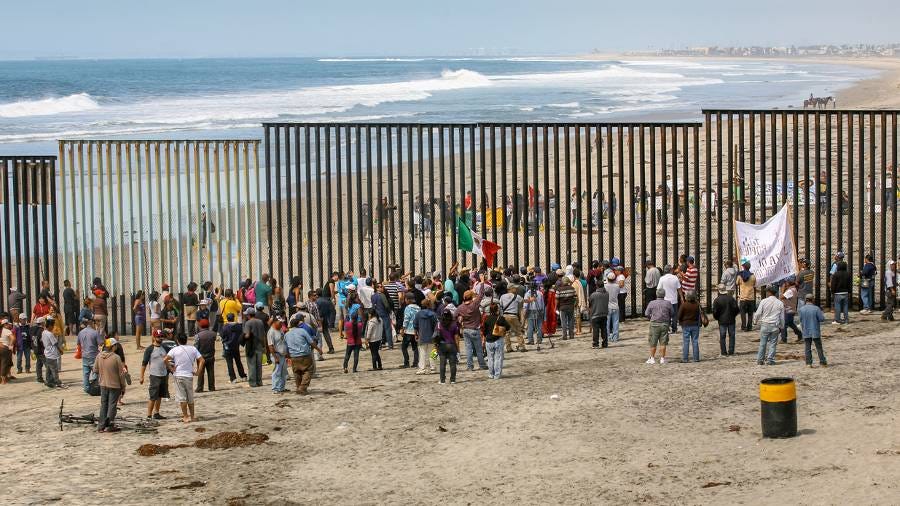Bafflement Over Borders
We need common-sense respect for citizenship and nationhood to be restored
by Frank Perley
This article was first published in The Stream.
Something there is that doesn’t love a wall.
More than a hundred years ago, Robert Frost penned these words in his oft-quoted poem “Mending Wall” to express a subtle, simmering vexation with the practice of building barriers that keep people apart. Frost leaves readers with a hat tip to reason: “Good fences make good neighbors.”
Similarly tangled sentiments over the practice of territoriality currently are bollixing the U.S. political landscape. They shouldn’t be. Americans cannot regain a peaceful social order until common sense prevails over border-related bafflement.
Obstructionist Judges
So far in his second term, President Donald Trump has followed through on his campaign promise to do all in his power to halt the inflow of an estimated 12 million illegal immigrants during Joe Biden’s negligent tenure. The extent of his power, however, comprises the front line in a legal war over the nature of citizenship and nationhood.
“Due process” has become the battle cry of the Democratic Party’s anti-American wing, which champions foolishly granting constitutional protections meant for U.S. citizens to every illegal immigrant who manages to breach the border.
Chants like “No one is illegal!” echo across the political landscape with the sensationalized case of “crimmigrant” and accused gangbanger Kilmar Abrego Garcia, whom the Trump administration deported from Maryland to his native El Salvador. The ensuing legal drama confirms that the “something” that doesn’t love a wall consists of open-borders activists like federal Judge Paula Xinis, who ordered the government to “facilitate and effectuate” Abrego Garcia’s return to the U.S.
Standing shoulder to shoulder with “her honor” is U.S. District Court Judge Colleen Kollar-Kotelly for the District of Columbia, who struck down portions of Trump’s executive order requiring potential voters to provide proof of citizenship. Election regulations, she ruled, are the sole domain of Congress and the states. That is little comfort to Americans who have for years been watching the erosion of election integrity undermine the value of privileges associated with citizenship.
Then came the shocking news that two judges, in Wisconsin and New Mexico respectively, were arrested and charged with helping illegal immigrants evade the law.
Hoover Institution scholar and political commentator Victor Davis Hanson observes: “We’ve really diminished citizenship, and the attitude of the Left is, ‘We wrote the law to bring in 10 to 12 million people, and we will warp the law and slow it down so that Donald Trump cannot deport one person.’ ”
The People vs. the Politicians
Unsurprisingly, a 2024 Gallup poll revealed that 84% of respondents favored requiring voters to show identification at the polls, and 83% supported requiring proof of citizenship when registering to vote. Those measures are simply common sense, and reveal that bafflement over borders, apparently, is primarily an affliction of the Left.
Whether an immigrant has lawfully entered the country should settle all questions about “due process.”. If the answer is “no,” that person should be shown the door — no further legal proceedings required. A court trial for each of the millions of uninvited noncitizens, as prominent Democrats are currently demanding, would crash the nation’s immigration court system and render the border essentially open to all — which some on the Right say was their goal all along.
Even if befuddled Joe Biden might have failed to grasp the impact of his open-borders policies, Washington’s left-wing establishment has spent years normalizing the ideology behind it. Hillary Clinton, for one, said the quiet part out loud in a 2013 speech: “My dream is a hemispheric common market, with open trade and open borders, some time in the future with energy that is as green and sustainable as we can get it, powering growth and opportunity for every person in the Hemisphere.”
There is little to fear, of course, from open trade. A line must be drawn, however, at Clinton’s dream of open borders. For the same reason sensible Americans equip their front doors with a lock, every nation has an obligation to safeguard its citizens by regulating who may enter its sovereign territory. Or, as Robert Frost observed, “Good fences make good neighbors.”
Hope, it is said, springs eternal, and borders open to any member of the entire human family is a commendable aspiration for a future that is more virtuous than the present. If the world of humanity’s dreams is to be realized, we must replace our current bafflement over borders with common-sense respect for citizenship and nationhood.
Frank Perley is a former senior editor and editorial writer for Opinion at The Washington Times.


